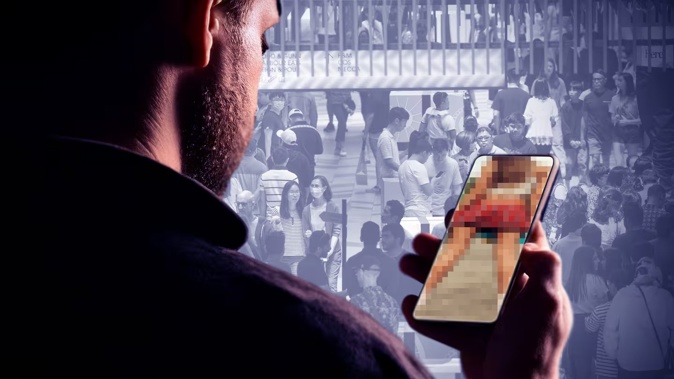
An Auckland man has been sentenced to 10 months home detention for secretly filming 62 women, including inside changing rooms at a Newmarket store, in public showers and toilets.
The footage of women uncovered by police spanned 16 months, filmed between June 2023 and October 2024. Of the 62 female victims, only three have been identified.
The man, in his 30s, was originally charged with 64 counts of making an intimate visual recording.
The covertly filmed videos were taken in private changing rooms at a Newmarket business, and in public places around the wider Auckland region under victims’ skirts on escalators, in toilet stalls and public showers.
The man is fighting to keep his identity a secret and currently has been granted interim name suppression.
At his sentencing in Auckland District Court today, the man bowed his head and wept during the proceedings.
He pleaded guilty to two representative charges of making an intimate visual recording, which carry a maximum sentence of up to three years in jail.
In a Newmarket store from 2023 to May 2024, the man captured footage of 13 other victims while hiding in a covert position above a changing room.
Six female victims were filmed in public showers in January 2024, with the defendant capturing intimate video of them over the top of a shower cubicle.
Three female victims were also filmed without their knowledge while using a public toilet facility in Auckland in April 2024.
The man was caught by police on October 7 last year after filming up a victim’s skirt in a Countdown supermarket.
As the woman was shopping, she felt something touch her inner calf, and turned to see the defendant standing behind her.
He then apologised to her and quickly exited the Countdown, which caused her to report the “concerning actions” to the police.
A search warrant uncovered further intimate pictures and video recordings on the man’s cell phone.
Judge Kathryn Maxwell said the “voyeuristic offending” involved a “gross invasion of privacy”, with the unaware victims being captured visibly or partially nude in footage.
“They [the victims] were not in a position to prevent what you were doing,” she said.
Crown prosecutor Manawa Te Ahuru-Quinn said one victim was firmly opposed to the defendant’s identity being kept a secret and had offered to lift her own name suppression to help prevent this.
Defence lawyer Daniel Schellenberg said the man was “genuinely remorseful” and had been attending church with his wife and was no longer watching pornographic videos.
The defendant had also been having counselling sessions with a registered clinical psychologist.
Revealing the man’s name would lead to him being socially shunned by the wider community and his family, which would have a flow-on effect, Schellenberg said.
Te Ahuru-Quinn said there was no evidence that publishing the defendant’s name would cause him to deter his efforts towards rehabilitation.
A psychologist’s report found “stress, loneliness and frustration” as well as a longstanding interest in pornography and up-skirting footage had contributed to the man’s offending.
However, it also said the defendant was “angry to get caught” and there was an average level of risk that he may sexually reoffend.
Schellenberg acknowledged there was “a level of premeditation” in his actions that was an aggravating feature for sentencing.
Judge Maxwell sentenced the man to 10 months’ home detention and instructed him to complete an appropriate rehabilitation programme as directed by a probation officer.
She declined his application for name suppression because his circumstances failed to meet the threshold of extreme hardship.
Maxwell said given the prolific nature of the offending, other victims may choose to come forward if the defendant’s name was revealed.
Schellenberg said the man was planning to launch an appeal against the decision on name suppression.
Take your Radio, Podcasts and Music with you









